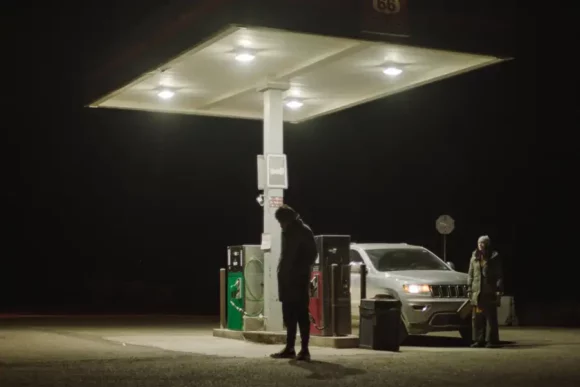Watching Mali Elfman’s Next Exit for New Scientist, 22 February 2023
From out of nowhere, a chink of light appears. With painful slowness, the light grows stronger: we are inching towards a half-open door. Beyond the door, everything seems normal. A little boy is playing a game of pretend. At least, that’s what we think. Soon enough, we learn what’s really going on: the boy is playing cards with his dead father.
Nothing else in Mali Elfman’s debut feature lives up to this unsettling opening sequence (though there’s a sight gag — two would-be suicides renting a car from Charon Vehicle Rental — that comes close).
Rahul Kohli and Katie Parker — actors who turn up regularly in work by horror director Mike Flanagan — play Teddy and Rose, driving across the US to an appointment with Dr Stevensen (Karen Gillan) who has promised them a clinically managed euthanasia. Teddy, a Londoner, has spent ten years trying and failing to make it in the United States, and figures that being turned into a pioneer ghost (his transition from life to death monitored with all the latest gear) will at least give his life some meaning. Rose is weighed down with guilty secrets, and just wants to be done with it all.
Mind you, even Rose is not as nihilistic as the man who, early on in the film, wonders in front of their hire car, and under their wheels, with a note pinned to his chest: “Thanks for the help”.
Suicides and homicides are common now, as Heaven beckons (or whatever passes as Heaven), and our hardscrabble lives on this ordinary Earth lose their preciousness and meaning. “Our trained mediums are standing by,” a radio advert announces, offering contact with the newly visible dead. This is a world lost to itself, snared by fantasies of the hereafter.
But what do these newly discovered ghosts really want, as they stream into our world through every available screen? Not every haunting is as touching as that of the boy and his dead parent. Rose guzzles bourbon by the bottle so as not to see her mother watching her from inside the motel pay-per-view. A friendly cop, caught up in a drinking game, confesses to a thoughtless on-duty prank that killed a family of five; not surprising then, that he thinks “they’re here to hurt us.” Karma, a hitchhiker Teddy and Rose pick up out in the desert, has her own doubts: ”Just because we can see them,” she points out, “doesn’t mean we understand them”.
It’s at this point, about half way into the movie, that the viewer’s heart, if it does not immediately sink, certainly begins to tip: surely this film has bitten off way more than it can possibly chew?
Teddy admits that what he really wants out of his own managed death is for the news to get back to his absentee father: “I’d rather kill myself than live the life you gave me.” This is not a bad line, but what follows is horrific, and not in any intended way: a stage-managed confrontation with Teddy’s dad; an impromptu psychodynamic therapy session in a filling station car lot. The script rights itself, but having lost all confidence after this compound pratfall, it delivers, in the end, only a low-key retread of Joel Schumacher’s 1990 flick Flatliners. (Judgement waits for us all; struggle gives life its meaning; you know the rest.)
Next Exit is a promising film, but not a good film. It warps the world into a very strange shape, to ask some valid — indeed, pressing — questions about where the value of life resides. But it loses its way. If the writing had exhibited half as much commitment as the acting, we might have had a hit on our hands.

